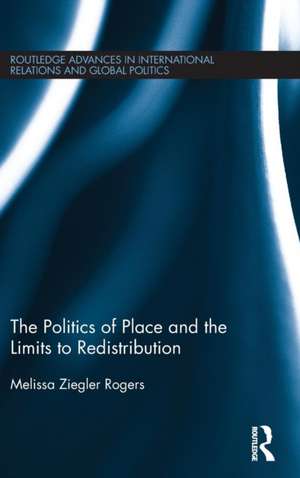The Politics of Place and the Limits of Redistribution: Routledge Advances in International Relations and Global Politics
Autor Melissa Ziegler Rogersen Limba Engleză Hardback – 5 noi 2015
| Toate formatele și edițiile | Preț | Express |
|---|---|---|
| Paperback (1) | 382.75 lei 6-8 săpt. | |
| Taylor & Francis – 13 dec 2021 | 382.75 lei 6-8 săpt. | |
| Hardback (1) | 1108.37 lei 6-8 săpt. | |
| Taylor & Francis – 5 noi 2015 | 1108.37 lei 6-8 săpt. |
Din seria Routledge Advances in International Relations and Global Politics
-
 Preț: 383.48 lei
Preț: 383.48 lei -
 Preț: 310.55 lei
Preț: 310.55 lei -
 Preț: 188.83 lei
Preț: 188.83 lei -
 Preț: 152.86 lei
Preț: 152.86 lei -
 Preț: 311.59 lei
Preț: 311.59 lei - 9%
 Preț: 1003.12 lei
Preț: 1003.12 lei -
 Preț: 317.91 lei
Preț: 317.91 lei - 8%
 Preț: 390.08 lei
Preț: 390.08 lei -
 Preț: 377.82 lei
Preț: 377.82 lei -
 Preț: 303.47 lei
Preț: 303.47 lei - 18%
 Preț: 1170.74 lei
Preț: 1170.74 lei - 18%
 Preț: 1051.55 lei
Preț: 1051.55 lei - 18%
 Preț: 1220.46 lei
Preț: 1220.46 lei - 28%
 Preț: 850.99 lei
Preț: 850.99 lei - 18%
 Preț: 1056.32 lei
Preț: 1056.32 lei - 18%
 Preț: 1053.57 lei
Preț: 1053.57 lei - 18%
 Preț: 1057.89 lei
Preț: 1057.89 lei - 18%
 Preț: 1056.32 lei
Preț: 1056.32 lei - 18%
 Preț: 1066.09 lei
Preț: 1066.09 lei - 18%
 Preț: 1062.26 lei
Preț: 1062.26 lei - 18%
 Preț: 1056.32 lei
Preț: 1056.32 lei - 15%
 Preț: 449.41 lei
Preț: 449.41 lei - 25%
 Preț: 300.01 lei
Preț: 300.01 lei - 18%
 Preț: 1167.36 lei
Preț: 1167.36 lei - 28%
 Preț: 820.56 lei
Preț: 820.56 lei - 18%
 Preț: 1060.87 lei
Preț: 1060.87 lei - 18%
 Preț: 1270.98 lei
Preț: 1270.98 lei - 18%
 Preț: 1167.71 lei
Preț: 1167.71 lei - 18%
 Preț: 1112.21 lei
Preț: 1112.21 lei - 18%
 Preț: 997.11 lei
Preț: 997.11 lei -
 Preț: 427.12 lei
Preț: 427.12 lei - 18%
 Preț: 1057.40 lei
Preț: 1057.40 lei -
 Preț: 355.58 lei
Preț: 355.58 lei - 18%
 Preț: 1057.75 lei
Preț: 1057.75 lei - 18%
 Preț: 1115.33 lei
Preț: 1115.33 lei - 18%
 Preț: 1052.89 lei
Preț: 1052.89 lei - 26%
 Preț: 850.37 lei
Preț: 850.37 lei -
 Preț: 389.38 lei
Preț: 389.38 lei - 18%
 Preț: 1120.55 lei
Preț: 1120.55 lei - 18%
 Preț: 1059.93 lei
Preț: 1059.93 lei - 18%
 Preț: 1059.84 lei
Preț: 1059.84 lei - 18%
 Preț: 951.96 lei
Preț: 951.96 lei - 18%
 Preț: 1058.79 lei
Preț: 1058.79 lei - 18%
 Preț: 1061.81 lei
Preț: 1061.81 lei - 48%
 Preț: 572.55 lei
Preț: 572.55 lei - 18%
 Preț: 1059.84 lei
Preț: 1059.84 lei - 18%
 Preț: 1000.27 lei
Preț: 1000.27 lei - 18%
 Preț: 1056.28 lei
Preț: 1056.28 lei - 18%
 Preț: 1057.75 lei
Preț: 1057.75 lei
Preț: 1108.37 lei
Preț vechi: 1351.68 lei
-18% Nou
Puncte Express: 1663
Preț estimativ în valută:
212.12€ • 220.63$ • 175.11£
212.12€ • 220.63$ • 175.11£
Carte tipărită la comandă
Livrare economică 15-29 aprilie
Preluare comenzi: 021 569.72.76
Specificații
ISBN-13: 9780415824323
ISBN-10: 041582432X
Pagini: 214
Ilustrații: 15 black & white illustrations, 3 black & white tables, 15 black & white line drawings
Dimensiuni: 152 x 229 x 18 mm
Greutate: 0.43 kg
Ediția:1
Editura: Taylor & Francis
Colecția Routledge
Seria Routledge Advances in International Relations and Global Politics
Locul publicării:Oxford, United Kingdom
ISBN-10: 041582432X
Pagini: 214
Ilustrații: 15 black & white illustrations, 3 black & white tables, 15 black & white line drawings
Dimensiuni: 152 x 229 x 18 mm
Greutate: 0.43 kg
Ediția:1
Editura: Taylor & Francis
Colecția Routledge
Seria Routledge Advances in International Relations and Global Politics
Locul publicării:Oxford, United Kingdom
Public țintă
PostgraduateCuprins
1. Introduction 2. Theory 3. Regional Disparity in the World 4. Parties, Electoral Rules, and Representation in Legislatures5. Executives and National Public Goods 6. Federalism and Decentralization 7. Conclusion
Notă biografică
Melissa Ziegler Rogers is Assistant Professor of Political Science at Claremont Graduate University. She specialises in comparative politics, Latin American politics, and comparative political institutions.
Recenzii
'Rogers joins a growing group of scholars applying the lens of political geography to the study of inequality and fiscal redistribution. In this book, she offers a new set of mechanisms connecting political institutions to redistribution levels, demonstrating through multiple channels the costs of territorially focused political institutions for income inequality.'—Bonnie M. Meguid, University of Rochester, USA
'This book makes an important contribution to better understanding one of the most important social problems. By highlighting the relevance of political geography, it offers a fresh explanation for how and why institutions shape the representation of the poor and the politics of inequality.' —Margit Tavits Washington University in St. Louis, USA
'This book makes an important contribution to better understanding one of the most important social problems. By highlighting the relevance of political geography, it offers a fresh explanation for how and why institutions shape the representation of the poor and the politics of inequality.' —Margit Tavits Washington University in St. Louis, USA
Descriere
Regional differences in wealth strongly affect national politics. Most politicians represent the interests of territories, and political debate to distribute government resources is a competition to bring money back to their district. The more wealth differs across districts, the wider policy preferences for citizens and their representatives will diverge, heightening conflict in national political institutions and influencing policy outcomes. How this affects countries depends fundamentally on the structure of their political systems. Using a large dataset of developed and developing countries in all regions of the world from 1980-2010, this book documents the extent of within-country differences in wealth and how that influences elections, political parties, executives, and federalism, and results in divergent education and health policy.















